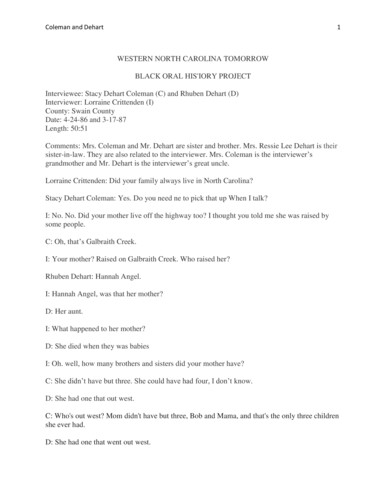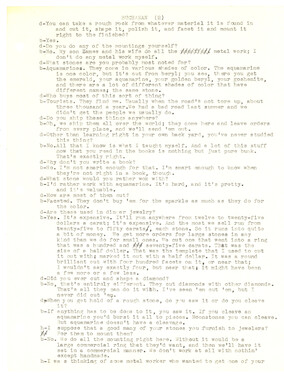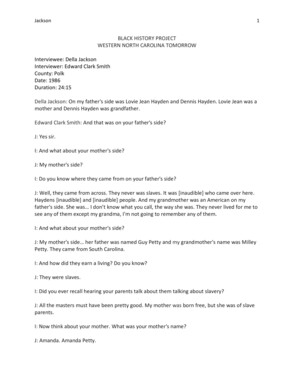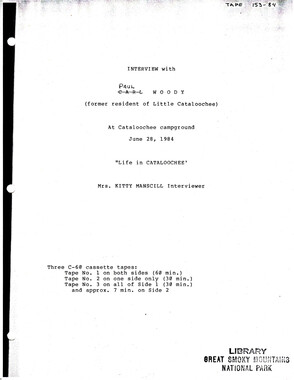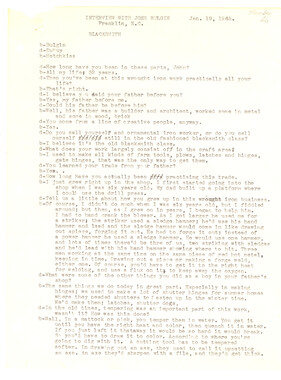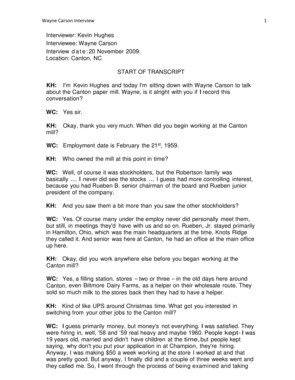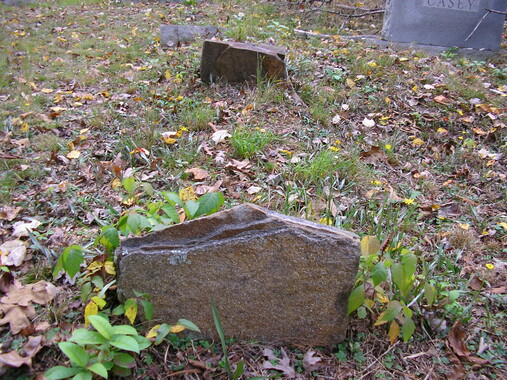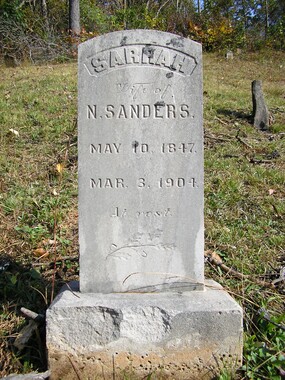Western Carolina University (20)
View all
- Canton Champion Fibre Company (2308)
- Cherokee Traditions (293)
- Civil War in Southern Appalachia (165)
- Craft Revival (1942)
- Great Smoky Mountains - A Park for America (2767)
- Highlights from Western Carolina University (430)
- Horace Kephart (941)
- Journeys Through Jackson (154)
- LGBTQIA+ Archive of Jackson County (24)
- Oral Histories of Western North Carolina (314)
- Picturing Appalachia (6772)
- Stories of Mountain Folk (413)
- Travel Western North Carolina (160)
- Western Carolina University Fine Art Museum Vitreograph Collection (129)
- Western Carolina University Herbarium (92)
- Western Carolina University: Making Memories (708)
- Western Carolina University Publications (2283)
- Western Carolina University Restricted Electronic Theses and Dissertations (146)
- Western North Carolina Regional Maps (71)
- World War II in Southern Appalachia (131)
University of North Carolina Asheville (6)
View all
- 1700s (1)
- 1860s (1)
- 1890s (1)
- 1900s (2)
- 1920s (2)
- 1930s (5)
- 1940s (12)
- 1950s (19)
- 1960s (35)
- 1970s (31)
- 1980s (16)
- 1990s (10)
- 2000s (20)
- 2010s (24)
- 2020s (4)
- 1600s (0)
- 1800s (0)
- 1810s (0)
- 1820s (0)
- 1830s (0)
- 1840s (0)
- 1850s (0)
- 1870s (0)
- 1880s (0)
- 1910s (0)
- Appalachian Region, Southern (15)
- Asheville (N.C.) (11)
- Avery County (N.C.) (1)
- Buncombe County (N.C.) (55)
- Cherokee County (N.C.) (17)
- Clay County (N.C.) (2)
- Graham County (N.C.) (15)
- Great Smoky Mountains National Park (N.C. and Tenn.) (1)
- Haywood County (N.C.) (40)
- Henderson County (N.C.) (5)
- Jackson County (N.C.) (131)
- Knox County (Tenn.) (1)
- Macon County (N.C.) (17)
- Madison County (N.C.) (4)
- McDowell County (N.C.) (1)
- Mitchell County (N.C.) (5)
- Polk County (N.C.) (3)
- Qualla Boundary (6)
- Rutherford County (N.C.) (1)
- Swain County (N.C.) (30)
- Watauga County (N.C.) (2)
- Waynesville (N.C.) (1)
- Yancey County (N.C.) (3)
- Blount County (Tenn.) (0)
- Knoxville (Tenn.) (0)
- Lake Santeetlah (N.C.) (0)
- Transylvania County (N.C.) (0)
- Interviews (314)
- Manuscripts (documents) (3)
- Personal Narratives (7)
- Photographs (4)
- Sound Recordings (308)
- Transcripts (216)
- Aerial Photographs (0)
- Aerial Views (0)
- Albums (books) (0)
- Articles (0)
- Artifacts (object Genre) (0)
- Biography (general Genre) (0)
- Cards (information Artifacts) (0)
- Clippings (information Artifacts) (0)
- Crafts (art Genres) (0)
- Depictions (visual Works) (0)
- Design Drawings (0)
- Drawings (visual Works) (0)
- Envelopes (0)
- Facsimiles (reproductions) (0)
- Fiction (general Genre) (0)
- Financial Records (0)
- Fliers (printed Matter) (0)
- Glass Plate Negatives (0)
- Guidebooks (0)
- Internegatives (0)
- Land Surveys (0)
- Letters (correspondence) (0)
- Maps (documents) (0)
- Memorandums (0)
- Minutes (administrative Records) (0)
- Negatives (photographs) (0)
- Newsletters (0)
- Newspapers (0)
- Occupation Currency (0)
- Paintings (visual Works) (0)
- Pen And Ink Drawings (0)
- Periodicals (0)
- Plans (maps) (0)
- Poetry (0)
- Portraits (0)
- Postcards (0)
- Programs (documents) (0)
- Publications (documents) (0)
- Questionnaires (0)
- Scrapbooks (0)
- Sheet Music (0)
- Slides (photographs) (0)
- Specimens (0)
- Speeches (documents) (0)
- Text Messages (0)
- Tintypes (photographs) (0)
- Video Recordings (physical Artifacts) (0)
- Vitreographs (0)
- WCU Mountain Heritage Center Oral Histories (25)
- WCU Oral History Collection - Mountain People, Mountain Lives (71)
- Western North Carolina Tomorrow Black Oral History Project (69)
- A.L. Ensley Collection (0)
- Appalachian Industrial School Records (0)
- Appalachian National Park Association Records (0)
- Axley-Meroney Collection (0)
- Bayard Wootten Photograph Collection (0)
- Bethel Rural Community Organization Collection (0)
- Blumer Collection (0)
- C.W. Slagle Collection (0)
- Canton Area Historical Museum (0)
- Carlos C. Campbell Collection (0)
- Cataloochee History Project (0)
- Cherokee Studies Collection (0)
- Daisy Dame Photograph Album (0)
- Daniel Boone VI Collection (0)
- Doris Ulmann Photograph Collection (0)
- Elizabeth H. Lasley Collection (0)
- Elizabeth Woolworth Szold Fleharty Collection (0)
- Frank Fry Collection (0)
- George Masa Collection (0)
- Gideon Laney Collection (0)
- Hazel Scarborough Collection (0)
- Hiram C. Wilburn Papers (0)
- Historic Photographs Collection (0)
- Horace Kephart Collection (0)
- Humbard Collection (0)
- Hunter and Weaver Families Collection (0)
- I. D. Blumenthal Collection (0)
- Isadora Williams Collection (0)
- Jesse Bryson Stalcup Collection (0)
- Jim Thompson Collection (0)
- John B. Battle Collection (0)
- John C. Campbell Folk School Records (0)
- John Parris Collection (0)
- Judaculla Rock project (0)
- Kelly Bennett Collection (0)
- Love Family Papers (0)
- Major Wiley Parris Civil War Letters (0)
- Map Collection (0)
- McFee-Misemer Civil War Letters (0)
- Mountain Heritage Center Collection (0)
- Norburn - Robertson - Thomson Families Collection (0)
- Pauline Hood Collection (0)
- Pre-Guild Collection (0)
- Qualla Arts and Crafts Mutual Collection (0)
- R.A. Romanes Collection (0)
- Rosser H. Taylor Collection (0)
- Samuel Robert Owens Collection (0)
- Sara Madison Collection (0)
- Sherrill Studio Photo Collection (0)
- Smoky Mountains Hiking Club Collection (0)
- Stories of Mountain Folk - Radio Programs (0)
- The Reporter, Western Carolina University (0)
- Venoy and Elizabeth Reed Collection (0)
- WCU Gender and Sexuality Oral History Project (0)
- WCU Students Newspapers Collection (0)
- William Williams Stringfield Collection (0)
- Zebulon Weaver Collection (0)
- African Americans (97)
- Artisans (5)
- Cherokee pottery (1)
- Cherokee women (1)
- College student newspapers and periodicals (4)
- Education (3)
- Floods (13)
- Folk music (3)
- Great Smoky Mountains National Park (N.C. and Tenn.) (1)
- Hunting (1)
- Mines and mineral resources (2)
- Rural electrification -- North Carolina, Western (2)
- School integration -- Southern States (2)
- Segregation -- North Carolina, Western (5)
- Slavery (5)
- Sports (2)
- Storytelling (3)
- World War, 1939-1945 (3)
- Appalachian Trail (0)
- Cherokee art (0)
- Cherokee artists -- North Carolina (0)
- Cherokee language (0)
- Church buildings (0)
- Civilian Conservation Corps (U.S.) (0)
- Dams (0)
- Dance (0)
- Forced removal, 1813-1903 (0)
- Forest conservation (0)
- Forests and forestry (0)
- Gender nonconformity (0)
- Landscape photography (0)
- Logging (0)
- Maps (0)
- North Carolina -- Maps (0)
- Paper industry (0)
- Postcards (0)
- Pottery (0)
- Railroad trains (0)
- Waterfalls -- Great Smoky Mountains (N.C. and Tenn.) (0)
- Weaving -- Appalachian Region, Southern (0)
- Wood-carving -- Appalachian Region, Southern (0)
- Sound (308)
- StillImage (4)
- Text (219)
- MovingImage (0)
Interview with Stacy Dehart Coleman and Rhuben Dehart
Item
Item’s are ‘child’ level descriptions to ‘parent’ objects, (e.g. one page of a whole book).
-
-
WESTERN NORTH CAROLINA TOMORROW BLACK ORAL HIS'IORY PROJECT Interviewee: Stacy Dehart Coleman (C) and Rhuben Dehart (D) Interviewer: Lorraine Crittenden (I) County: Swain County Date: 4-24-86 and 3-17-87 Length: 50:51 Comments: Mrs. Coleman and Mr. Dehart are sister and brother. Mrs. Ressie Lee Dehart is their sister-in-law. They are also related to the interviewer. Mrs. Coleman is the interviewer’s grandmother and Mr. Dehart is the interviewer’s great uncle. Lorraine Crittenden: Did your family always live in North Carolina? Stacy Dehart Coleman: Yes. Do you need ne to pick that up When I talk? I: No. No. Did your mother live off the highway too? I thought you told me she was raised by some people. C: Oh, that’s Galbraith Creek. I: Your mother? Raised on Galbraith Creek. Who raised her? Rhuben Dehart: Hannah Angel. I: Hannah Angel, was that her mother? D: Her aunt. I: What happened to her mother? D: She died when they was babies I: Oh. well, how many brothers and sisters did your mother have? C: She didn’t have but three. She could have had four, I don’t know. D: She had one that out west. C: Who's out west? Mom didn't have but three, Bob and Mama, and that's the only three children she ever had. D: She had one that went out west. C: Whose her brother that went out there? There's three children that I know of. D: Yeah, that's right. I: There were three brothers and sisters? Did Aunt Hannah raise them? C: Yes. I: Is Aunt Hannah Black? C: Yes. I: Was she raised on Toot Holler too? D: She was raised on Galbraith Creek. I: You said your daddy was raised on Toot Holler? C: My daddy wasn't raised on Toot Holler. I: Where was he raised? C: Where did they come from, Rhuben? D: Out there on the Dehart farm. C: They originated from the Deharts, but he wasn't raised on Dehart on Toot Holler. D: I reckon he come from out on Peachtree. I: Out on Peachtree? D: Yes. I: On the DeHart’s farm? D: No. Just put down Peachtree. C: He wasn't raised out there. His daddy took him out there. D: Well, he was raised there, Stacy. He was just in one place and then another. I: Why was that? D: Grandpa just traded he stayed here and sell this piece, he'd soon leave there and then go somewheres else. I: Do you mean land? D: Yes. I: How did he get the money to buy his land? Your Grandpa? D: He was a trader. C: You know like you say he just do one thing to another and he moved around where the land was, you know where trees and things like that. I: Did he cut down the trees and stuff? C: Timber, uh huh. D: He drove a truck from here to Charleston, South Carolina. I: Carrying What? C: Taking stuff and bringing stuff back. I: You mean wood or different things? D: Tobacco. I: Tobacco? C: Uh huh. You know he just traded. D: Uh huh. That's What they said. I: So your grandpa was Roughin DeHart. C: Yes. I: Who raised your grandpa? C: I don't know nothing about that. D: He was a slave. I: He was in slavery? D: Uh huh. I: So, after he got out of slavery he did all this trading? D: Yes. I: That's good. C: The DeHarts are the oldest settlers in Swain County. I: Now are you talking about the white DeHart’s out on… C: You know we’re colored DeHarts. See we come from the white ones. That’s where we got our names from. I: So your grandpa was DeHart/s slave? C&D: Yes. I: Now was your grandmother? D: She was a slave. C: Uh huh, DeHart’s slave too. I: So they were all on the sane farm? And so they had your daddy while they were out at DeHarts. D: Uh huh. They were freed there. I: They were freed from the DeHarts? D: Uh huh. I: Was that their only child? Your daddy was their only child? C: No. Uncle Jesse, Uncle Johnny, Henry, Alfred, Arnold and Tom. I: And all of these were slaves? C: My daddy was under slavery but the children were never sold. I: Right. But your daddy’s daddy and his brothers were all slaves. D: No. C: Yeah. D: Some of them were and some weren’t. C: All of them stayed under my daddy’s rule. My granddaddy. He kept all of his children. They never was sold out. I: So, Roughin DeHart who was your granddaddy. C: And his children never was sold. I: Now What happened to his children after slavery was over? C: They were just first one place and another. I: They left Swain County? C: All of them except Jesse and John and Aunt Jane and now Aunt Mary and Albert and Howard. One of them died, who was that? D: That was Albert. C: He died, you know, at his house, back up here. I: Where, in Toot Holler too? C: No. D: Yeah. C: He was buried up here like going to Deep Creek in that graveyard. I: Is that the graveyard where you’re going to Deep Creek Park and you say you have an uncle there? C: Yeah. That’s right. I: After they were freed from slavery, you said most of them left? What about the ones Who stayed here? How did they make a living? D: They farmed and cut timber. I: Did any of them own their own farm? D: Grandpa owned. C: Well, it was left his heirs and was divided up after my daddy and grandmother died. Peachtree was divided to the children. I: And so they farmed and cut timber to make a living. C: Uh huh. I: Now, how did you get this farm in Swain County if they were raised in Peachtree? D: I told you my grandpa just traded back and forth. He used to own all of Deep Creek over there. I: Your granddad? D: Yeah. You see we just can’t get all that now we got Peachtree. I: Well, it’s important to know that he owned land in Swain County. C: Oh yeah, a lot of land down on Tennessee Valley and all that stuff. I: And he eventually sold it all. C: Yeah. I: Now, how did Grandaddy Jim get the land to raise you all? D: He bought his. I: He bought it in Bryson. C: He bought his land from T. D. Bryson. D: Uh uh. Colonel Bryson. I: From Bryson City? C&D Yes I: Where was that land located? C: Right here. I: In this spot we’re in? C: Yeah. I: Oh. O.K. Now, you said that Grandma Ida lived Where? C: Galbreith Creek. I: And so she married Granddaddy Jim and then that’s When she came to Bryson City. C: No, she didn’t come right then but she finally come here, you know Marna went to Asheville. I: She went to Asheville before. C: Yeah, when she was young and then Papa married her in Asheville and brought her back here. I: What was she doing in Asheville? C: She went to Asheville and worked over there. I: Did she work for a white family or What? C: Yeah, but I don't know all that. I: Were they young When they got married? C: Yeah, they were young people. My daddy said he was 30 years old, well, that w:>Uld make Marna about 20 years old because daddy had been a bachelor, you know. I: So he was pretty well established when he married. C: Oh, he was. He had a little home of his own and everything. I used to hear them talk about that's the reason he got married on account of coming in at nighttime and having to cook for himself and no fire in the house and he could have a wife you see and have his food and the house would be warm. He lived out down there you can't see it now rut down there on that hillside, still Toot Holler. I: So after he married her then they came back to Bryson City and started a family. C: Yeah. I: Now, how did he make his living all those years, still on farming? C: Uh huh. I: Well did he sell the crop or what? C: He got pay for that because he still worked for the Colonel Bryson. They give him so much and he hauled lumber, oh, that's where he got his home from, he hauled lumber from Alarka. That's what he said, he used to be out on Alarka hauling lumber into town, logs and stuff into town, and that would make lumber you know. I: So he made his money there? But then you said he worked some of the land for the Brysons. C: Yes. I: But he wasn't paid for that. C: Yeah. I: Oh, he was paid for farming for them too? C: Yes, he was paid. I: Well, with ten brothers and sisters, did your Grandma Ida work outside the home? C: No, she stayed at home. I: Do you remember thinking that you were really poor, especially since your daddy had land and a farm and hauled timber and all that? C: Yeah. Well, he had to, we just got a living, just made a living. I: And you traveled by horse and buggy? C: Yeah. He had his horses and buggies and cows. I: Now who farmed his farm? The children? C: He rented from the Brysons. I: But I mean who did the work on the farm? C: The children. I: O.K. How did your days start? C: Lord, I can't tell you all that? D: Six o'clock in the morning. C: Seven o'clock! D: Six o'clock! Old man say you ought to have that horse a sweatin’ at six o'clock. (laughter) C: It's early in the morning when you get out. I: So what time did you get up if you had to start at six? D: Get up at four o'clock. C: Got up at five o'clock, Rhuben, don't just say any old thing. D: I ain't saying any old thing! C: Five o'clock in the morning. I: OK. What was the first thing you had to do? You had breakfast, I assume. C: Had to feed his horses first and then come back to the house. I: How many horses did he have, do you remember? D: Four. I: Did he have any other livestock? C: He always had cows and pigs and things like that. I: Who fed those? C: He did. I: Your daddy? C: Uh huh. He might have been getting up at 4 o'clock in the morning with all that work before he go to work. I: If you all fed the horses and came back to the house, what did you do after you came back to the house? C: When we got big enough we done that. The children done that. He done all that before he got married. I: He did the horses and things While Mama was getting breakfast. Then he come back to the house and eat breakfast and go to work. I: But not on his land, on somebody else's. D&C: Yeah. I: Well, who did all his work? D: The children did. I: Did you do all his work before you went to school? C: Yeah, but we didn't have that much farming then of our own. Papa done more farming for A. T. Bryson. D: Yeah, we done all this work milking the cow and feeding the pigs. I: What did you do with the milk? C: What did we do with it? I: Did you make butter? C: Oh yeah, we churned. Mama churned that milk. We had a spring. We didn't have refrigerators, put it in a box and water would run through this box and fasten this box up and keep the milk and butter in it. I: You put the box in the spring? C: Down in the drain part and the water would drain from the spring through the box. I: Would it freeze in the wintertime? C: In the wintertime we kept it in the house. I: How did you keep it cool, though? C: Just set it out would keep it cool. I: Just set it on the table? C: In the dining room or somewhere like that where it was cooler. I: OK. You had ten brothers and sisters. Now what size house did you have? C: We had two bedrooms upstairs and two downstairs, make four, five. We had six rooms. I: Now, when did you all start working outside the home? D: When I was thirteen. I: What did you do? D: Public work. construction work. I: What did you construct? D: Carry blocks, brick. I: Do you remember the first projects you worked on, Uncle Rhuben? What were they building? D: Building a store. I: Right here in Swain County? D: Yeah. I: Do you remember Which store it was? D: Let's see… Coffee's. I: What kind of store was that? D: They sell hardware down there. I: Coffee's Hardware? And so you didn't go to school anymore? D: Yeah, I went to school but school was out. C: We had school for six months. I: And then after that you worked. And you were doing construction work at 13. D: Yeah. I: How much did you get paid? D: A dollar a day. I: You worked how many days a week? D: Five. I: Did you go outside the home, mama, to work? C: Yeah, when I got big enough. I: What did you do? C: What you call just daily work. I: Domestic work? C: Dishes and mopping, ironing, things like that, housework. I: How many days a week did you work? C: Oh, I just done daily work. I: How many? Five days a week? C: No, just maybe three or four days a week. I: Well, then, how much did that kind of work pay? C: You know, how much did we get back in them days? Didn't get nothing much, did we? D: Seventy-five cents or a dollar. C: Now, don't you meddle in my stuff, I let yours go. (laughter) You just hush about mine. I'm trying to think what did we get a day? First we didn't get nothing much, do you know? What did we get in this type of work? Go out here and do a washing and they pay you seventy-five cents or a dollar. We didn't get so much. I: What did you have to do with your money? Was it yours or did you have to give it back to Daddy Jenkins? C: It was mine. I: So you didn’t have to help support the family? C: The others were done gone. I had my own money. I kept it. If Mana wanted something she knew we would give it to her, but we kept our own money. She didn't take it, you know like lots of people take their money. They didn't take it. I: How much education did you get? C: Didn't go no further than the seventh grade here. I: Did anybody go off to get a higher grade? C: I went up to Spellman' s Seminary and I went through the eighth. I: And did your brothers and sisters all have an education? C: They had the seventh grade. I: Where was the school? C: Bryson Branch. I: So if you lived here, you had to walk? C: Walk across the hill. I: How far was it? D: A mile. C: Just a mile. Yeah, Bryson Branch. You remember Where that little store used to be? Up on Bryson Branch? I: McKinney? C: Well, the next place up there was our school building until they moved us, you know. I: Who was the teacher, do you remember? Or did they have a lot of different teachers? C: Mr. Frank [Murr] was my teacher for years When I first started. Jim [Murr] I: Where did he come from? C: Franklin. I: He stayed here? C: Until he died. I: Well, if he only taught school six months, what did he do the other six months of the year? C: I don't know. I: Do you remember Uncle Rhuben? D: He done a day's work. I: What, construction or what? D: Yeah, construction, just anything he could get. I: Did you notice, was everybody about on the same income level or were some people better off? D: Some were better off. C: I don't know Who it was any better off. Who would you say? D: Old man Tom [Kats] C: You know Tom [Kats] didn't have no more than my daddy had. D: Well, well, I was telling who was the best ever! It was Tom Kats and my daddy, and ... I: So you weren't any poorer than anybody else? C: Oh no, no, my daddy we had plenty from one year to another. I: Now I know church was always part of your life. C: Yes. I: How did you spend your Sundays? C: We went to Sunday School, then we had church and come back home. I: Then What would you do Sunday evening? C: Just play around the house if we didn't have church. See back in them days we had church in the evening time. And sometimes in the morning time. We would have an eleven o'clock sermon, then in the afternoon and sermon maybe at night. I've went to church many times at night. We just spent our evenings playing around the house. I: Did you have neighbors? C: Mag Williams was the closest neighbor. I: Now I remember Aunt Mag was a slave, so Ms. Enma. and Ms. Francis, those were her children, right? C: No, those were her grandchildren. I: Did they come to play with you all? C: Yes. I know Emma did. I: Do you remember any religious customs that they had when you were younger that we don't have today? Any special meetings or anything? C: Meetings? D: We've got most of them. C: We ain't got nothing. We had Sunday School and we had prayer meeting and we had big revival meetings. You know people run a meeting for two weeks. I: A revival? C: Oh, yeah. Didn't Hillard give you all that? I: Aunt Hillard said it would last a week and sometimes longer if the people wanted it. C: Yeah. That's the way it do. I: Well, did the people come from surrounding places like Sylva? C: Oh, yeah. They come different places. I: Well, if they came from as far as Canton, did they go back that day or did they stay? C: Oh, they wouldn't come that far, just kind of around the neighborhood. I: But if somebody wanted to come from far away they would just stay with friends or something? C: Uh huh. Neighbors or relatives you know like that. I: Do you remember any other… C: We had missionary meeting, the old people did, the woman did. I: What about baptismal services? C: Yeah, we would have baptizing up at Deep Creek. That's where I was baptized at. That's where I was baptized. I: Did the preacher stay a long time or did you get a new one every so often? C: We changed every so often. Lord, Rev. Richie stayed here so long we thought he belonged here, didn't we Ressie? (laughter) I: Where did he come from? C: You know they say he was a Georgia man but I just don' t know. They say he's from Georgia, that's Where he originated from. I: Were the children christened in Church? Sprinkled with water? C: No, that' s the Methodists. I: The Methodists did it but the Baptists didn't. Was there a Methodist Church then? C: Yeah, it was but I don't know nothing about that. It was out yonder on the hill. That's What that lot is out there on the hill now. That's the Methodist Church lot. The Baptists took it somehow. Bryson give them a lot of power. And that lot just stayed cut there. It's still out there. I: What's on the lot now? C: Nothing. You know where we walked to out there. I: Out there where it’s the senior citizens apartment? C: No, it's back up here on the hill behind Mike. I: Right in our backyard in other words. Do you remember any other religious customs? C: No. I: What about funerals? The ceremonies then. D: Sit up all night and sing over them. The next day, put them in a wagon and take them to the graveyard. I: They stayed up all night and sang? D: Uh huh. I: And the body was in the house? D: Yeah, at the house. I: And then the next day they were just buried? C: They kept’ em up three days now. See, back in them days we didn't have all these experiments you know. I: Embalmment? C: Embalmment and examiner and all that stuff. In three days. How did they do in your part of the country, Ressie? Ressie L Dehart: They kept em up three, sometimes four days. C: Three days then they knowed they were dead and then they put em in the wagon, we had a wagon, we didn't have no truck. I: Well, who built the casket? C: I don't know where they got all that, I don't know they were ... D: They had 'ern built, you know, by carpenters and things like that. C: How did they do in your part of the country, Richard? Unknown: My granddaddy and them would build them. C: That Is what I thought. I: So the carpenter had a pine block and you said some of them did what? D: Made a basket. I: A basket long enough for a body? D: Yeah. Had a split. C: I never have heard that, you ain’t seen that either cause I’m older than you. I never have seen one put in no splits. Don’t you put that down there! (laughter) They always made these boxes. I: Do you remember any historical event more than the others, such as any of the wars that stand out in your mind? Like World War I or something like that, anything that happened in history that affected everybody? C: Not unless that’s what it was. I: Do you remember Uncle Rhuben? D: Huh uh. I: What about World War II? C: I had a son in that. And I had a cousin in World War I. I: Do you remember When Uncle Bud was in World War II? How were times in Bryson City and Swain County? Were they harder when the war was going on? C: They were better. Wasn’t nobody much here and see we had a train back in them days. It was better. I: You used the train to travel? C: Yes. To travel from place to place back in them days we had to go on a train. I: So even during the war people still had work and everything. What about during the Depression? Do you remember that? C: We just had what work we could pick up. There wasn’t work much here to do. D: What you eat you had to make it. You didn’t get much money. I: What about for your staples, your flour, sugar, and coffee? C: We had to work that out. D: No one raised their flour. C: People always had these farms raised it. We raised our corn. I: Did you make that into flour or meal? C: Uh huh. I: Did your granddaddy have a threshing machine? C: My granddaddy, my daddy used to go around with the threshers on these farms and he would thresh your wheat and he would get this wheat for flour. I: OK. Now you said you raised your sugar? C: No, we didn’t raise our sugar. I: Was it hard to get, sugar during the depression? C: Yeah. I: Would they ration it out? C: Oh yeah, they limit you so much. They had food stamps, books. I: What did you buy with those books? C: About anything that you wanted, just so much. But the stamps allow you to just get so much. Maybe green stamps for vegetables and red stamps for something else. I: Did you have to go on a special day to get your ration card? C: Yeah, they had the food delivered. We had to have certain days when they distributed this food. I: What would you have to do, walk downtown? C: Yeah, they had certain places in town. Used to walk that way up there towards that old store to get it. Certain days and get in line, put you in line this year? I: Well, did the Black people have a harder time getting those rations, foods than white people? C: No not that I knows of. But the giveaway stuff was hard, wasn't it? D: Yeah. I: What did they give away? C: Lord, they give away so much. It was beans, dried prunes, and powdered milk, Lord, I can't think of what else. I: But you didn't get that as easily as the whites got it? C: No. And they used to give hams and stuff away like that and that was hard to get. You know Frank DeHart was the one that give it out, he wouldn't give us Black people anything hardly. I: What about the doctors, going to doctors and so forth. D: You had to do that on your own. I: So they come to the house? C: Oh yes. Had babies and if you was sick they would come to the house. Yeah, back in them days they would come to the house to see you. I: Did it cost a lot? C: No, it wasn't that high. I: Who delivered the babies? C: The doctor. I: Your mama' s babies? C: Yeah, when doctors, we had old midwives back in them days too. I: But the women always had them at home. C: Yeah. D: No hospitals. I: Well, could Black people go to the doctor's office? C: Yeah. If you was able enough to go you could go. I: Did they make you stay outside or anything like that? C: No, they take you in. But I don't think they had you in the sane room. I: That's what I mean, did you have to sit in a separate room? C: I can remember When Dr. Braden come here we had to sit outside in the hall and the White people in the reception room, didn't we? They just have separate rooms. I wasn't sick back in them days but you know… I: So doctors and midwives delivered all of your children? C: I didn't have but one midwife and that was Ailene. I: They were delivered by doctors, the rest of them? C: Uh huh. I: What were the marriage customs like then? C: I don't know what it was. Marriage was just marriage. I: You said the justice of the peace came to Uncle Fred's house and married you and daddy? C: Yes. I: And then after you got married you just went home to Governor's Island? C: Then come on back home here. I come back hone and he come back home. I: You didn't stay together the first month? C: No. I: How long before you all stayed together? C: I don't know When it was because he didn't have nowhere to take me. [Sometimes] I'd go there and stay some with them and then come back and stay at mama's. I: So he was in Governor's Island with his family? C: No, they lived out here on the hill. I: What was Daddy doing in Governor's Island? C: Fred Hal lived up there and Fred Hal got our license. I: Well, was Daddy living with Fred Hal then? C: No, that's his uncle. I: Well, why was Daddy in Governor's Island? C: Just because he wanted to go. Uncle Fred got his license for him and he kept them ' till we come up to his house. I: Well, when did you all get your own house? C: Well, I guess we never did get one until after mama died. Lived in the old hone place. I: Your mother and father's hone? C: Yes. I: And then you moved into their place and started your family. C: Yes. And he finally built us a house down below from where we were living I: Who built the home? C: Bob [Estus] and a [Wiggins] man. I: And so you had your 10 children there? C: Yes. I: Did you work while you were raising your children - outside the home? C: Yes, part-time. I: What did you do? C: Just day work. I: What about after the children started coming? C: I didn’t work too much. I stayed home with them. I: What did daddy do to earn money? C: He just worked around - worked in pressing clubs and different jobs. I: Was it always in Bryson City? C: No. He had to leave hone sometimes. I: So you had to take care of all the family by yourself? C: Yes, while he was gone. I: Did you raise a garden, too? C: Oh, yes. I: Your children went further in school. C: Oh, yes. I: Was it a different school than from where you went? C: Oh, yes. They done moved it after that. They came back over here next to [Harris]. I think that's Where Bertha and them began at. Because they took that place up there. Bertha and them went to school over here. All my children went to school in this new building. I: Now, can you think of any particular contributions that Black people made to western North Carolina, like helping to build the Blue Ridge Parkway, Nantahala Dam, or anything like that? C: I don't know. I: Uncle Rhuben, do you know? D: What was that? I: Did any Black people work on projects such as building Nantahala Dam? D: Yeah! I: So, they were doing construction work on Nantahala Dam? D: Yes. I: Were there any particular projects in Bryson City that the Black people worked on? D: Yes. Hammering, pouring concrete… I: For the town? D: No. I: For what? C: Rhuben, she's asking if there's any particular work that you all done for the town. What in particular? D: Put in water lines. I: You put in water lines? D: Yes. I: Now, was there anything that the Blacks did, specifically for the Blacks, like build anything? D: No. I: Not even churches? D: Yes, we helped build the school house. I: Who built the Churches? C: Black people had to build that, or help. Some would give money. We built our own Church. I: So you either gave money or helped with the land? C&D: Yes. I: And that's the church that was down here below the house? C: Yes. I: How many years was that church over here? C: I don't know. I: I remember as a Child, going to church down here, for a long time. D: I think it (was built) around 1914 or 1915. I: Around 1914 or 1915? D: Yes. I: And it stayed over here until the church was built over there on Bryson Branch? C&D: No! C: It left Bryson Branch and come over here. I: Why did it leave Bryson Branch? D: They sold that and come over here. C: They sold that over there and Bryson give them -he had a lot down there that he let them have. See it belonged to the Bryson's and he sold that. Then he had a lot over here near my daddy's, and that's where he lived. I: Oh, so the Black people built the church that was here all these years? C: Yes. I: When was the church across the hill built? C: I don't know. I: Did the Black people build that? C: Yes. We got help from the community. I: Do you remember anything bad that happened to Black people? D: No. I: Well, what about being allowed to go anywhere you want to? C: Oh, no! We wasn't allowed to go in cafes and restaurants. We had to go to the back. I: What about travel. If you wanted to go somewhere, what about travel? You mentioned a train earlier. C: We had to ride in the back of the train. I: And then the bus came along later? C: Yes. Had to ride in the back of the bus until Martin Luther King cleared the thing up. Lord, I'll never forget those old bus rides. I took you many times you and your mama. We had to sit at the back of the bus make me so sick. I: Anything else like that you remember? D: uh-uh. I: Now, can you think of anything else that I didn't ask you that stands out in your memory about your life here in Swain county? C: I don't know. I: Why are there so few blacks? C: On account of work! They didn't give them any work at the plants and things. They wasn't allowed to work in these plants. There wasn't no work. No work for blacks. I: What about Blacks in the coal yards? D: There were no coal yards then. I: So either you farmed or you left… D: Yes. I: …or did domestic work? C: Yeah, or pick-up jobs and things like that. I: Well, did the young people leave at an early age cause they couldn't get work? C: Yeah, had to. I: How old were your children when they started leaving home? C: I believe Roland was the youngest one, he was about 17. I: And then he went in which direction? C: Ohio, and he's still there. I: What about some of your other children? C: Well, the rest of my children didn’t leave too early. They just -- after they got married, then, they left. Aileen went off to boarding school. Thelma went off to boarding school and [Evan] went off to boarding school. I: Where did he go? C: He went to Greensboro, then he went to Chicago. I: To school? C: To college. He took up refrigerating in Chicago. Then he went down to Greensboro one year. I: At A&T? C: Yeah. And then, you know, Hazel, she went off to boarding school. She stayed down there for a while. I: And so now, mama… C: Bertha and Bud and them didn’t go off to school. But Bertha went off one year. Bud didn’t go off and Willie didn’t go off. I: Well, what was the highest education they could get here in Swain county? C: Seventh grade. I: Do you remember anything else? C: Before Less (not sure of this name) and them left, they did get to go to Sylva on the bus. I: So they could ride the bus back and forth to boarding school? C: Yeah. I: Except for your four oldest children? C: Before the schools were integrated. I: What has been the best thing to happen to you in Bryson City? C: Well, when they integrated the schools and they gave us a chance to go to these different public places. I: Did most of the Black people own their own homes? Or were you among the first? C: They owned their own homes. I: Why were they so spread out? C: It depended on the land and Who they had to buy it from. I: So your family didn't choose to go to the other side? C: Oh no. There was more property over here. I: Mama, you' re 83 years old… C: 82. I: What would you tell young people to do to live to the ripe old age of 82? C: I don't know. I: Why do you think you lived and been healthy so long? C: No smoking and… all that. I: So you think that helped keep you in good health? C: It helped. Yeah, I had good health. I never was sick coming up, nor my children. I: No more than when you were having your children? What about – what would you tell them about education? C: Oh, I think you should go on the school and get a better education and get better jobs. I: Has anyone else ever asked you questions like this, other than your children? C: Well, lots of people. I: But no one from like Clerk-of-court in Bryson City, has asked you for your family history? C: No. I: OK. Thanks granny.
Object
Object’s are ‘parent’ level descriptions to ‘children’ items, (e.g. a book with pages).
-
Stacy Dehart Coleman and Rhuben Dehart are interviewed by Lorraine Crittenden on April 24, 1986 and March 17, 1987 as part of the Western North Carolina Tomorrow Black Oral History Project. Sister and brother, Mrs. Coleman and Mr. Dehart trace their family lineage from their grandparents who lived in Bryson City. They describe doing chores on the farm and attending church services growing up. Mr. Dehart recalls food rations and distribution during the Great Depression and African Americans building churches. They both discuss segregated conditions in Bryson City, such as riding in the back of the bus and entering restaurants through the back doors.
-
